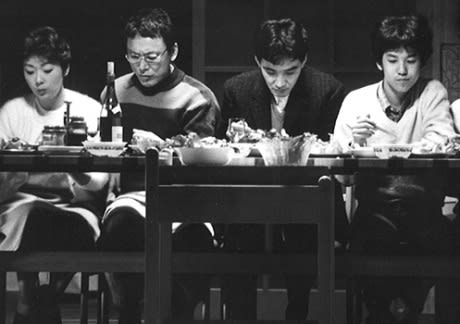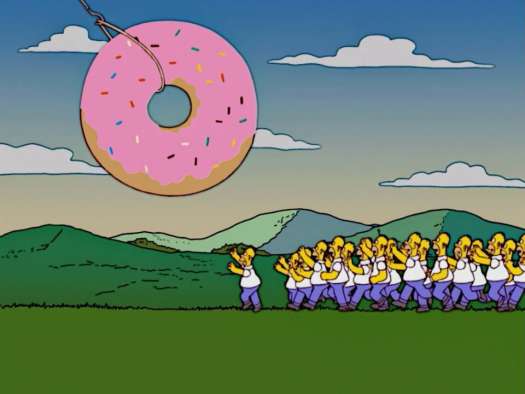Well before awkward comedy gained widespread favour in western entertainment, Yoshimitsu Morita made waves in the Japanese cinema scene of the '80s with the very specifically uncomfortable and hilarious film, The Family Game.
Adapted from Yohei Honma's novel, Morita thoughtfully employs exaggeration to deconstruct the Japanese nuclear family and the constrictive cultural roles each family member traditionally inhabits.
To introduce the Numata clan, the director presents each member in isolation, engaging in an idiosyncratic eating habit. An audio theme throughout the film, featuring the sound of every crunch, slurp and scrape is ridiculously amplified, highlighting how annoying the habits of people sharing intimate space can feel to each other.
That sense of crowding permeates nearly every frame and breaches of personal space create much of the humorous tension throughout the film. How rigid ideas of proper and polite conduct can fail us is central to the anarchic subtext of Morita's deceptively clever presentation of the story. Even taken at face value, The Family Game has a lot to say about the futility of standardized education and typical family structures.
Shigeyuki (Ichirota Miyakawa), the youngest son, is the black sheep of the family—he's a shit disturber with poor grades due to disinterest in fulfilling expectations, both at home and in school. It's not that he's stupid; he just doesn't see the point in pretending.
His mother coddles him, bending to every fib and whim as her role as the provider of comfort dictates; it's not her place to question or confront him. Similarly filling their archetypical positions, Shigeyuki's father is a workaholic drunk with no interest in the personal lives or feelings of his children, and his older brother is a well-mannered boy sporting a pristine academic record.
With high school entrance exams coming up, Shigeyuki's parents hire a tutor to boost his grades so that he can get in to the school they want him to attend – never mind that he'd prefer a less esteemed school to ensure that he won't continue being stuck with a local bully he's grown up sharing classes with.
A seventh year student of a mediocre college, the handsome Yoshimoto (Yusaka Matsuda) initially seems like a kind and polite man who will break through Shigeyuki's indifference with hard work and compassion. In actuality, Yoshimoto slowly reveals himself to be more like a trickster spirit of sorts, pushing the boundaries and comfort zones of his young charge and employers with increasing irreverence and impropriety each day, managing to get results in the process.
From one scene to the next, the audience is kept guessing as to which line he'll cross next and how far he'll go to get the bonus money promised for each class ranking Shigeyuki gains. Unlike Todd Solondz's Happiness, though, The Family Game doesn't get nearly as creepy as it seems it might. But it does gets plenty weird, climaxing with a hysterical dinner scene that punctuates the tactics Yoshimoto has been using all along to shake the whole family out of their rote behaviour patterns.
Full of highly considered shot composition that emphasises emotional and physical claustrophobia, as well as unique sound design and a talented cast that balance naturalism with the absurd, The Family Game is a classic dark comedy packed with so many layers that you'll feel intellectually satiated while still having plenty to chew over days later.
The Family Game screens at the TIFF Bell Lightbox as part of the Japanese Cinema of the Eighties retrospective at 7:30pm on March 10, 2013.
(Circle Films)Adapted from Yohei Honma's novel, Morita thoughtfully employs exaggeration to deconstruct the Japanese nuclear family and the constrictive cultural roles each family member traditionally inhabits.
To introduce the Numata clan, the director presents each member in isolation, engaging in an idiosyncratic eating habit. An audio theme throughout the film, featuring the sound of every crunch, slurp and scrape is ridiculously amplified, highlighting how annoying the habits of people sharing intimate space can feel to each other.
That sense of crowding permeates nearly every frame and breaches of personal space create much of the humorous tension throughout the film. How rigid ideas of proper and polite conduct can fail us is central to the anarchic subtext of Morita's deceptively clever presentation of the story. Even taken at face value, The Family Game has a lot to say about the futility of standardized education and typical family structures.
Shigeyuki (Ichirota Miyakawa), the youngest son, is the black sheep of the family—he's a shit disturber with poor grades due to disinterest in fulfilling expectations, both at home and in school. It's not that he's stupid; he just doesn't see the point in pretending.
His mother coddles him, bending to every fib and whim as her role as the provider of comfort dictates; it's not her place to question or confront him. Similarly filling their archetypical positions, Shigeyuki's father is a workaholic drunk with no interest in the personal lives or feelings of his children, and his older brother is a well-mannered boy sporting a pristine academic record.
With high school entrance exams coming up, Shigeyuki's parents hire a tutor to boost his grades so that he can get in to the school they want him to attend – never mind that he'd prefer a less esteemed school to ensure that he won't continue being stuck with a local bully he's grown up sharing classes with.
A seventh year student of a mediocre college, the handsome Yoshimoto (Yusaka Matsuda) initially seems like a kind and polite man who will break through Shigeyuki's indifference with hard work and compassion. In actuality, Yoshimoto slowly reveals himself to be more like a trickster spirit of sorts, pushing the boundaries and comfort zones of his young charge and employers with increasing irreverence and impropriety each day, managing to get results in the process.
From one scene to the next, the audience is kept guessing as to which line he'll cross next and how far he'll go to get the bonus money promised for each class ranking Shigeyuki gains. Unlike Todd Solondz's Happiness, though, The Family Game doesn't get nearly as creepy as it seems it might. But it does gets plenty weird, climaxing with a hysterical dinner scene that punctuates the tactics Yoshimoto has been using all along to shake the whole family out of their rote behaviour patterns.
Full of highly considered shot composition that emphasises emotional and physical claustrophobia, as well as unique sound design and a talented cast that balance naturalism with the absurd, The Family Game is a classic dark comedy packed with so many layers that you'll feel intellectually satiated while still having plenty to chew over days later.
The Family Game screens at the TIFF Bell Lightbox as part of the Japanese Cinema of the Eighties retrospective at 7:30pm on March 10, 2013.




